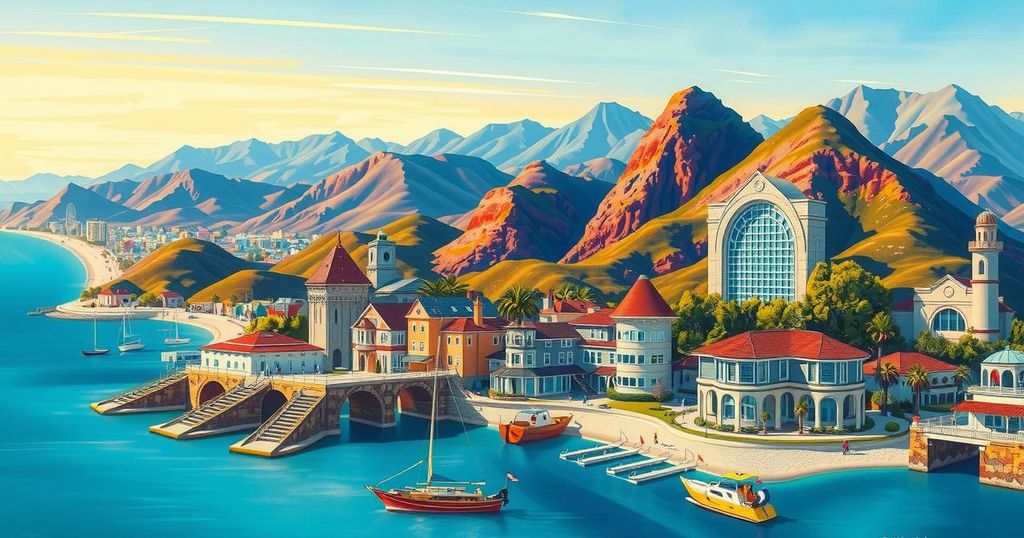Why So Many People Outside California Dislike the Golden State
California remains a divisive topic in American politics, seen as a symbol of liberal ideology by many conservatives. This was evident in a recent speech by President Trump in North Carolina, where criticism of California drew boos from the crowd. Republican narratives often spotlight California’s issues, but the state’s economic power and cultural significance persist, complicating its portrayal.
There’s a palpable tension in the air when people discuss California, and it was evident during President Donald Trump’s recent speech in Fort Bragg, North Carolina, where he mentioned the state’s governor and Los Angeles’ mayor, prompting boos from the crowd. Strikingly, this reaction came from an audience that’s a staggering 2,556 miles away from the Golden State. This underscores a peculiar yet potent strategy employed by Republicans: they’ve built a narrative centered around California as the embodiment of their political adversaries.
As many in the North Carolina crowd likely wouldn’t recognize Governor Gavin Newsom or Mayor Karen Bass at all, they symbolise an ideology that Republicans love to criticise. “California is an idea,” remarked Ross Baker, political science professor at Rutgers University. Its symbolic weight carries a lot of emotional impact for those outside its borders, especially among conservatives.
For the rest of America, California remains a paragon of coastal elitism, radiating liberal values—this sentiment was expressed by Kate deGruyter of the Third Way think tank. “California, for probably a lot of the country, is the epitome of coastal elites and epicenter of liberal ideology,” she said. This stereotype makes it easy for GOP leaders from states like Florida and Utah to highlight California’s issues—housing difficulties, rampant homelessness, and catastrophic wildfires—as cautionary tales against high taxes and increased regulation.
Dem Democrats, despite holding political power, have often been seen as falling short of delivering on their promises. DeGruyter pointed out that the state’s leadership hasn’t fulfilled expectations related to affordable housing and infrastructural development. “It’s sort of a picture of how Democratic governance isn’t delivering what we profess voters should be able to expect,” she added.
The Golden State’s reputation seems to be amplified due to its status as a cultural epicentre, the heart of the entertainment industry, and its giant economy. People feel an odd familiarity with California. “America loves California. We hate California politics because it’s extreme left, and extreme left is not where the country is,” said Mark Campbell, who has worked on high-profile Republican campaigns.
Tourism remains a lifeblood for California, with over $131 billion in revenue last year primarily from domestic visitors. As Rep. Brad Sherman quipped, “People don’t go to western Nebraska on vacation. They come to see Hollywood.” But for many Americans, understanding the geography of Los Angeles—including the realities behind protests—is elusive. Misleading narratives perpetuated by key figures have led many to form inaccurate opinions.
Republicans have painted California as a chaotic battleground controlled by ineffective liberals. The online discourse following recent protests revealed a pattern of exaggeration, depicting the state as a threatening war zone, with personnel like Trump calling protesters “animals” and commenting about flags being burned. The politicization of these issues was only intensified when Homeland Security Secretary Kristi Noem faced controversy for her handling of an event that led to the ouster of Senator Alex Padilla.
“Padilla entered a high-security federal facility under false pretenses and crashed an invite-only press conference,” McLaughlin from Homeland Security stated. In recent times, the focus on California as a target for political criticism has become commonplace. At various Republican events over the decades, including the 1984 Republican convention, the state was cut down as the bastion of perceived leftist ideologies.
The label of “San Francisco values” took flight in the 1990s, serving as a convenient shorthand for Republicans to undermine Democratic policies. With names like Nancy Pelosi leading the charge, California continues to be presented as a liberal stronghold. For political figures like Rep. Kevin Kiley and Senate Majority Whip John Barrasso, attacking California remains an integral tactic, furthering perceptions of a radicalized Democratic Party abandoning American values.
As we reflect on the evolving political landscape, the Golden State remains undeniably tied to its economic prowess and cultural influence. Regardless of the criticisms levelled against it, California remains a dream destination for many seeking fame and fortune. Veteran politicians note that these attacks have long been a part of political discourse. Rep. Mike Thompson mused that California bashing often fills the void in Republican messaging, and Rep. Sherman wisely warned, “we may turn out to be a tougher target than they realise.”
The persistent narrative around California offers an interesting insight into how politics has evolved, yet the state’s influence continues to shape America in myriad ways. It seems like, for better or worse, California will remain in the national spotlight for years to come.
In a nutshell, California’s reputation outside its borders is shaped heavily by political rhetoric, often painting the state as a bastion of liberal ideology. While Republicans capitalise on these narratives to bolster support against perceived coastal elites, the Golden State’s influence, both culturally and economically, endures. Despite numerous critiques, it still draws many from across the nation, making it a complex tapestry in American identity.
Original Source: www.sacbee.com
